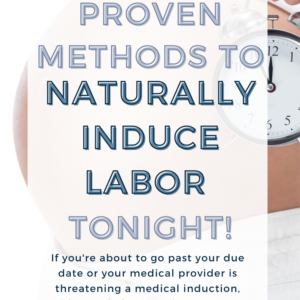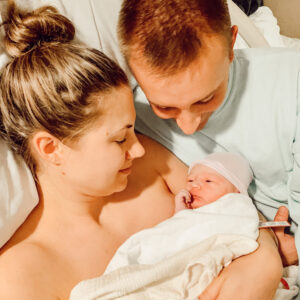Natural birth preparation is exciting! But it also can be scary and overwhelming. Don’t overlook the single most important way for making sure your natural birth plan goes to plan. In this post, learn how to find a natural birth doctor who will respect your wishes and help you have a healthy, successful unmedicated birth.

Before finding the right natural birth doctor, you must start off by deciding where you want to deliver your baby. Some care providers can only attend births at certain birthplaces. For example, doctors won’t attend home births and midwives don’t have privileges at some hospitals. So choosing your health care provider goes right along with choosing your birthplace.
[convertkit form=1775034]
Related: Choosing the Right Birthplace for Your Natural Delivery
To have a healthy and happy birth experience, it’s important that you like and trust your provider and birth place. However, circumstances can arise where you disagree or feel uncomfortable. Remember that you have the right (in most countries a legal right) to choose the care you and baby receive.
The earlier you decide on your birthplace and natural birth doctor the better. For example, some birthplaces, like a birth center, won’t accept patients to be admistered after a certain number of weeks gestation. As soon as you find out you’re pregnant and ready to start your natural brith preparation, finding the right doctor should be at the top of your list.
** However, if you aren’t getting along with your care provider or feel they don’t respect your birth wishes, you can change caregivers. More on that later.
In addition to timing, it’s also important to develop a relationship with your health care provider during your prenatal visits. This way she better understands your birth wishes, health history of you and baby or any other medical information that arises.
Natural Birth Preparation and Finding the Right Natural Birth Doctor

Choosing the right caregiver during your natural birth preparation is extremely important. A caregivers education, training and approach to overall care will vary from person to person and practice to practice. You want a health care prover who believes that birth is a normal, healthy process and typically safe. This results in fewer medical interventions and testing.
Sometimes testing or procedures are routine, which means its standard practice and offered to all pregnant women, regardless of the caregiver or birthplace. For example, gestational diabetes testing, the anatomy scan, and group-B testing are typically preformed on all pregnant moms. Other times, testing is individualized or standard for one particular caregiver and not another.
Understanding a caregiver’s approach to prenatal care and labor and delivery, along with evaluating your own preferences will help you decide on the best natural birth doctor for you and your baby.
Types of Caregivers
Caregivers can be categorized into two groups: physicians and midwives. Education, training, personal and professional experience, scientific research and more can impact a caregiver’s opinion and philosophy regarding pregnancy and birth.
It was a common understanding that a more natural approach to birth could be seen in the midwifery model of care. A more medicinal approach would be seen from a medical model of care. However, with more research and understanding and understanding of natural birth, there can be an overlap in practices.
Related: My Natural Birth Experience in a Hospital
Some physicians are beginning to lean toward a midwifery model of care, while some midwives may lean more toward a medical model of care. That’s why doing your own research when choosing a caregiver is so important during natural birth preparation.
Physicians
Obstetrician/gynecologists (OB/GYN) – Obstetricians provide most maternity care in the United States. Hospitals and OB/GYN practices are easily accessible and most women don’t switch providers from their gynecologist. OB/GYNs are medical doctors who specializes in women’s health. They’ve had training in obstetrics, which is the surgical specialty related to women’s reproductive health, and gynecology, which is the medical and surgical treatment in women’s reproductive system. Much of their education focuses on the detection and treatment of diseases.
Perinatologist – Perinatologists are OB/GYNs who’ve furthered their training to specialize in high-risk pregnancies. They work in a clinic or hospital and women who are high-risk will be referred to them.
Family Physician – A family physician is a medical doctor completes additional education in family medicine, including maternity and pediatric care. Their education focuses on the needs of the entire family.
Related: 10 Critical Natural Birth Questions to Ask Your Doctor
Midwifery

Although midwives are widely used around the world, their popularity continually increases in the U.S as the desire for a more natural birth continues to rise. Their education and training varies, but they all follow the Midwifery Model of Care.
Midwives typically take a more natural, intervention and medicine free approach to maternal care and labor. However, should complications arise during care, you may be referred out to a specialist.
Certified Nurse Midwives (CNM) – CNMs have graduated from a four year program of nursing school and have completed a year or more of additional education in midwifery. CNMs have passed an exam by the American College of Nurse-Midwives and are able to deliver babies. Some deliver in homes or birth centers, and some CNMs work in hospitals.
Certified Midwives (CM) – CMs have completed a four year degree in a health-related field and have passed the same certification and testing as CNMs.
Licensed Midwives (LM) – LMs’ certification level and licensure varies by state. Currently, 35 states recognize and allow LMs to practice.
Certified Professional Midwives (CPM) – CPMs have received training from various sources and attended a certain number of births. They must pass an exam by the North American Registry of Midwives. and practice outside of hospitals.
A drawback you need to consider for midwifery during your natural birth preparation is the state you live in. Midwifery practice dates back as far as women birthing, but it’s recently becoming popular. Some states don’t yet recognize some midwifery certifications, therefore, finding a midwife may be difficult.
You can search for a CNM here. Look for a LM or CPM here.
Medical Model of Care
- Childbirth is significant event and it’s the caregivers responsibility to support with the medical aspects and intervene when any complications arise.
- Focuses on preventing, diagnosing and treating complications that arise during maternity care, labor and delivery.
- The natural childbirth process is unpredictable and potentially unsafe.
- Routine testing and protocols are crucial for women for help caregivers offer the best care.
- Caregivers use routine interventions often before problems arise, and if problems arise, they use the intervention that works the most quickly.
- Medical interventions can improve labor and delivery.
Midwife Model of Care
- Childbirth is a significant event. A caregiver should offer medical support, along with emotional and physical support for mom and baby’s overall well-being.
- Childbirth education is helpful because a women’s understanding and birth participation aids in healthy, happy maternal care.
- The natural childbirth process can be unpredictable but is normally safe.
- Routine testing can provide useful information but individualized care is necessary.
- Caregivers monitor mom and baby and if problems arise, less risky interventions are utilized first before moving to more complex or riskier interventions.
- Low intervention births and cesarian section rates are ideal.
Interviewing Your Natural Birth Doctor
You have the right to interview and decide what practice will be best for your birth. The idea of interviewing providers can seem silly or scary but it’s essential in natural birth preparation.
Your caregiver largely decides your prenatal care, birth experience and treatment during labor and delivery. Interviewing potential care providers ensures that you’ve done your part in choosing the best care for you and your baby. It’s critical to have someone understand and respect your birth plan.
Take note of a caregivers attitude, question responses and comfort level to tell you about a caregiver’s approach to birth and overall care. Additionally, you want a caregiver who has good bedside manner and respects you as a person and expecting mom. A caregiver who is short, rude or impatient may give you the same approach to care and respect.
A caregiver’s website can provide a lot of information about a practice or philosophy of care. Feel free to interview more than one care provider, and remember to start the process early. Some facilities have long wait periods to get an appointment. Some places, like birth centers, will require you to take a tour or submit an application before taking appointments. Pregnancy lasts a long time, but you want to establish care as early as possible.
Switching Natural Birth Doctors
To have a healthy and happy birth experience, it’s important that you like and trust your health care provider and birth place. However, circumstances can arise where you disagree or feel uncomfortable. Remember that you have the right and responsibility to choose the care you and baby receive.
It will seriously change your birth experience and outcome. So what happens if you don’t like your health care provider? There are three ways to handle this for mamas who can an
- Express your discomfort and what would make you feel better. Do so without accusation or placing blame. You can say something like, “I get the impression you disagree with my preference or my questions are an inconvience to you.” Using the pronoun I gives the impression that you are the one having trouble. It allows you to get your point across without offending anyone. Being too direct can cause tension in the relationship. This is potentially problematic if you don’t have the option to switch providers.
- If the approach doesn’t work, it may be time to consider switching care providers. Remember not to drop care from a practice before new care is established. Also remember that if you’re in a group practice, if you only disagree with one provider, you should consider if it’s worth switching practices. The odds of that one provider attending your labor are probably slim. For example, if there are 10 providers in your group practice, but you only dislike 1 of them, chances of that person being on call for your delivery are roughly only 10%. You should consider if switching practices will give you better odds of liking all the providers.
- If you’re unable to switch caregivers, you should talk with another provider or nurse about your concerns. You can also address your concerns with the care provider in question with a non-confrontational approach. If you don’t come up with a resolution or your care provider continues to push his beliefs onto you, you have the legal right to refuse and testing, routines or unacceptable practice.
Natural Birth Preparation Conclusion
Planning for natural birth is really exciting. You’ve read all the books, you know the labor positions, but don’t overlook the most important part of natural birth preparation. Choosing your health care provider has one of the biggest impacts on your prenatal care and labor and delivery. For some mamas, this isn’t as impactful, but if you want a natural birth, this is the most impactful thing of all.
Feeling safe, cared for and respected contributes to a good birth experience. Do your research on what kind of caregiver you’d prefer for care and delivery. Interview and ”shop” around for the right caregiver and if necessary, remember that you can always switch if needed.











Leave a Reply